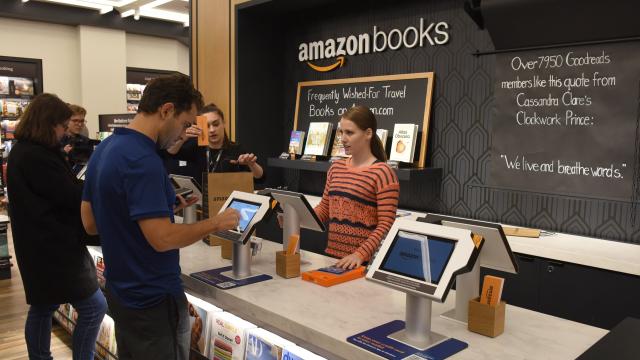Amazon is perfecting a different kind of business model than we’ve traditionally known. First, crush an industry by focusing on growth instead of profit. Then, swoop in to “fix” the industry that was destroyed. Now that the online retailer is moving into the brick and mortar world, it’s trying to prevent the in-store price comparisons that have served it so well against competitors.
Photo: Getty
Following the announcement of Amazon’s massive bid to buy the Whole Foods grocery chain, the Washington Post reports that the company has patented an algorithm that’s designed to discourage “mobile window shopping”.
Customers’ habit of visiting stores like Borders and checking the Amazon prices while they browse is understood to have played a major factor in Amazon’s competitive victories over the last decade, so it’s beginning to take measures to ensure that it doesn’t suffer the same fate.
The algorithm isn’t going to prevent a dedicated customer from checking out other retailers on their phones… for now. All it does is make it more difficult for any shoppers who are on the store’s Wi-Fi. The “Physical Store Online Shopping Control” patent analyses the mobile browsing of the customer and if it determines that they are visiting a competitor’s website it will redirect them in one of a few ways. From the report:
It may block access to the competitor’s site, preventing customers from viewing comparable products from rivals. It might redirect the customer to Amazon’s own site or to other, Amazon-approved sites. It might notify an Amazon salesperson to approach the customer. Or it might send the customer’s smartphone a text message, coupon or other information designed to lure the person back into Amazon’s orbit.
This isn’t a five-alarm fire warning of impending dystopia but it should give everyone pause at a crucial moment in Amazon’s history. Most analysts who covered the Whole Foods deal yesterday understood that it likely signals a huge expansion of the company’s ambitious delivery plans.
The New York Times‘ outlook was a little more granular in its outlook, saying that Bezos and co. are always looking for a place to experiment with what works. Amazon is gradually pulling everyone deeper into its eco-system and playing around with throttling customer’s mobile browsing is not the greatest omen.
Amazon’s attempt to enter the smartphone market hasn’t really had much of an impact yet, but imagine if it had. Imagine if it does. Imagine the retailer building some sort of system that has control over your phone while you shop in any of its stores. Obviously, that’s a scenario that the average consumer would revolt against, for now. But it’s an example of how tricky a truly dominant corporation could be if it runs rampant.
The Whole Foods deal still isn’t set in stone, it still has to be approved by shareholders and regulators. Amazon might want to take it easy on showing off anti-competitive practices while the government is deciding whether or not a deal is bad for the marketplace.
